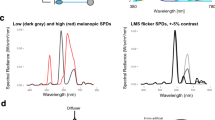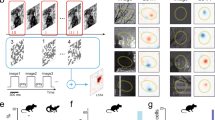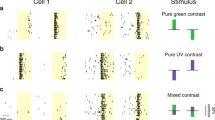Abstract
IT is usually asserted that scotopic vision, that which is associated with the rods, gives no sensation of colour. Nevertheless it has also been suggested that under photopic conditions the rods may function as the blue-sensitive receptors. In support of this idea it is cited that: (1) the fovea which is rod-free also lacks blue-sensitive receptors; (2) rhodopsin admixed with a large proportion of its own product of bleaching, visual yellow, could have a resultant activity – wave-length relationship similar to that expected for the blue-sensitive receptor; (3) moonlit scenes seem somewhat bluish although an analysis of the light shows it to have a lower colour temperature than sunlight.
This is a preview of subscription content, access via your institution
Access options
Subscribe to this journal
Receive 51 print issues and online access
$199.00 per year
only $3.90 per issue
Buy this article
- Purchase on Springer Link
- Instant access to full article PDF
Prices may be subject to local taxes which are calculated during checkout
Similar content being viewed by others
References
Kellershohn, C., Die Farbe, 4, 159 (1955).
Author information
Authors and Affiliations
Rights and permissions
About this article
Cite this article
WOOLFSON, M. Colour associated with Scotopic Vision. Nature 202, 278–279 (1964). https://doi.org/10.1038/202278a0
Issue Date:
DOI: https://doi.org/10.1038/202278a0
Comments
By submitting a comment you agree to abide by our Terms and Community Guidelines. If you find something abusive or that does not comply with our terms or guidelines please flag it as inappropriate.



